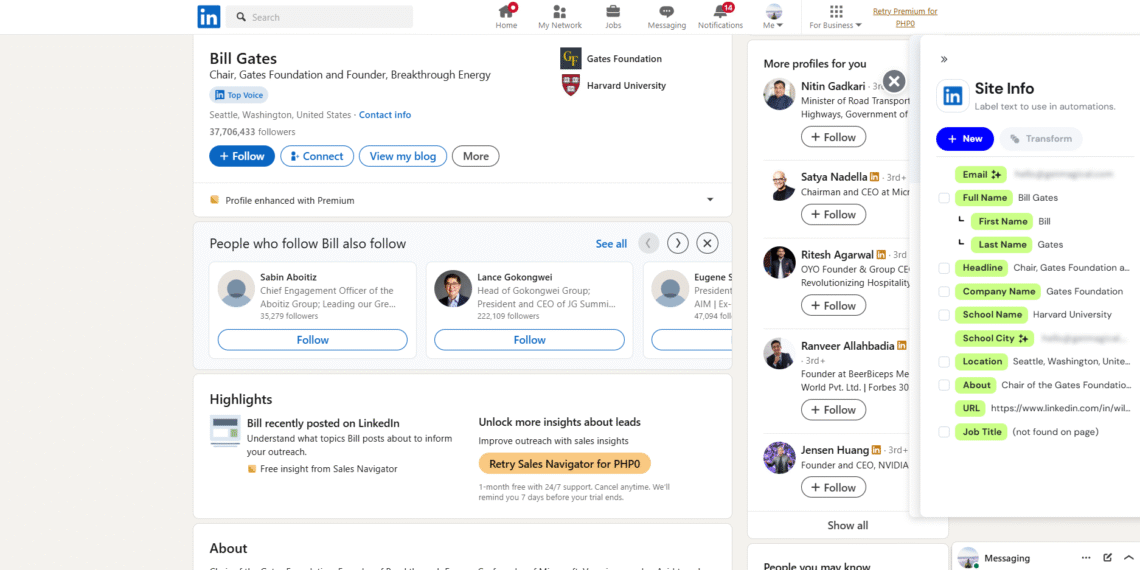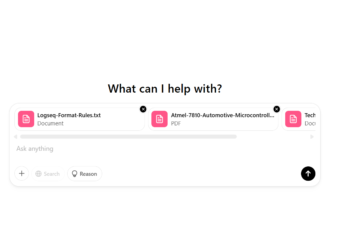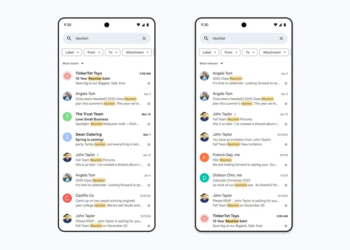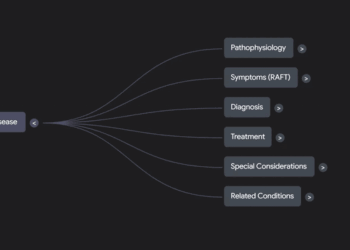Many AI extensions promise to revolutionize your workflow but often end up just providing a chatbot in a sidebar. I’ve experimented with numerous options, and only a handful have genuinely enhanced my productivity. These tools earned their place not because they were flashy, but because they reduced my need for endless clicks and scrolling.
If you often find yourself filling out forms, sending repetitive emails, or transferring data between applications, I recommend checking out Magical. I’ve managed to save several minutes each day by setting up custom shortcuts that expand into complete email templates or form inputs with just a few keystrokes.
The true time-saving feature of Magical lies in its data extraction capabilities. I used a cumbersome Python tool for scraping data from websites for years, but now I just rely on Magical to gather information from web pages. For instance, if I need to collect contacts from LinkedIn, I can easily extract the data directly into a CRM or spreadsheet without any tedious copy-pasting. One of the best things about Magical is its compatibility with nearly any website, as it allows you to define fields when it doesn’t automatically recognize labels or elements on the page. It took me under 10 minutes to set it up for sites like Amazon and YouTube.
If web scraping is on your to-do list, Magical is a straightforward option—there’s no need to have a tech background. For smaller data sets, I suggest using Magical. For more extensive collections, Thunderbit might be the better choice.
Thunderbit is essential for those who gather extensive data from the internet. It simplifies the process by allowing you to scrape entire web pages with a single click, neatly organizing the collected data. With one click, Thunderbit can extract content from webpages, identifying essential elements like articles, images, and links, and compiling them into an easy-to-navigate format—eliminating the need to sift through everything manually when collecting information online.
What sets Thunderbit apart from Magical is its capability to handle paginated sites. Rather than scraping one page at a time, Thunderbit can automatically navigate through multiple pages to gather all necessary information. This feature alone has saved me countless hours while tracking GPU listings and monitoring price changes throughout the month. I appreciate single-function tools like Thunderbit; they often offer the simplest user interface while being remarkably effective at their designated purpose.
Creating tutorials and documentation can be one of the most tedious productivity tasks we face. The process usually involves rehearsing, taking screenshots, writing notes, and elaborating on each step of the workflow. Scribe simplifies this task by recording each step as you navigate a process, then organizing the recorded information into an easy-to-follow document. After completing the workflow, you can edit and refine your documentation with built-in tools.
Scribe has a unique feature that many similar services lack—the “Guide Me” function. When activated, a sidebar appears with step-by-step instructions highlighted, showing users exactly what mouse clicks and movements to make. Once a step is completed, the panel automatically advances to the next one, creating a seamless flow. This makes it much easier for readers to follow along with the tutorial.
If you’re looking to put together a detailed guide for family or colleagues, Scribe is one of the best AI tools I’ve found for getting the job done efficiently.
Video meetings can often consume a lot of time. I’ve tried Fireflies in a couple of Google Meet sessions and found it invaluable when maintaining focus is crucial. Fireflies transcribes meetings in real time and generates concise summaries immediately afterward. Instead of scrambling to take notes or rewatching recordings, I can concentrate during the video call, knowing I’ll receive a well-organized recap afterward.
I especially appreciate the floating transcript pane. It allows me to bookmark significant moments during the meeting and add comments on the spot, ensuring that I don’t overlook important points that I might want to refer back to later.
Moreover, Fireflies can also transcribe and summarize video content from platforms like Loom, making it a time-saving asset. If your schedule is packed with meetings, Fireflies can help you reclaim your productivity by transforming conversations into searchable, actionable notes.
If you often find your notes scattered across various applications or lost in lengthy documents, Saner.AI could transform how you organize information. I use Saner.AI to capture ideas and meeting notes in a sidebar panel, where its AI assistant, Skai, automatically tags and organizes my notes as I type.
This allows me to spend less time searching for notes and more time acting upon them. Skai’s natural language search feature lets me ask questions like “What decisions were made in the last meeting?” and receive instant replies.
Saner.AI can also summarize PDFs and link related ideas with mind maps, making it an excellent tool for research and project planning. If you’re looking to cut down on organization time and focus more on creation, Saner.AI could be a great fit for you.
For those who read extensively online or conduct research, Glasp is an incredibly useful tool for managing notes. With Glasp, I can highlight text on web pages or PDFs and add annotations directly in my browser, keeping my research well-organized and easy to revisit.
One of Glasp’s standout features is its smooth integration with note-taking applications like Notion. Once I’ve collected my highlights and notes, I can effortlessly export them, complete with metadata such as page titles, URLs, and my annotations, ensuring all my research is centralized.
Glasp is ideal for anyone tired of losing track of vital information or juggling multiple apps, making it an excellent option for keeping your research organized and accessible—saving you valuable time in the process.
Grammarly is the AI extension I turn to daily without a second thought. Beyond catching typos and grammar errors, it provides real-time suggestions that enhance the clarity and tone of my writing. This results in fewer revisions and reduced stress over word choice.
Grammarly is user-friendly and requires no complicated setups. It quietly aids me in daily writing tasks, from emails to lengthy documents, making it an invaluable free Chrome extension for students aiming to produce error-free essays and reports.
What I particularly appreciate about Grammarly is its feedback and explanations for every suggestion it makes. These brief insights help me understand the reasoning behind each recommendation, which in turn makes it easier to avoid similar mistakes in the future. Not only does it enhance my writing instantly, but it also helps me evolve as a better writer over time.
The time saved by avoiding embarrassing errors and extensive rewrites is substantial. Grammarly allows me to write quickly and confidently, delivering an immediate productivity boost.
Perplexity is my go-to tool when I need quick and accurate answers without the distractions of extensive browser searches. During research sessions, particularly on complex topics, Perplexity helps me cut through the noise. Instead of opening numerous tabs and sifting through search results, I simply click the extension and receive a concise answer in the sidebar.
One feature I find particularly useful is the “focus” option in Perplexity. The “This Page” function sources answers from the webpage I’m currently visiting, “This Domain” gathers information from the entire site, and “All” searches across the internet. This saves me from wading through irrelevant data, significantly speeding up my research process. The extension is lightweight, so it doesn’t slow down my browser or clutter my workspace. Its simplicity means that it would function seamlessly even if used on an Android device.
Using Perplexity has helped me save countless minutes that would otherwise be spent switching between tabs and filtering out ads or unrelated content. I highly recommend it for anyone needing a straightforward research tool to find reliable information efficiently.
Merlin takes everything I enjoy about Perplexity and adds even more functionalities to save me time. I’ve utilized Merlin for various work projects, and its ability to upload files and query information is invaluable. Instead of scrolling through long PDFs or reports, I can upload a file and ask Merlin specific questions, effortlessly pulling out the exact details I need in a matter of seconds.
Merlin also provides a web search feature with a focus setting, streamlining my searches just like Perplexity. An additional highlight is its AI chatbot. Merlin allows you to access multiple AI models for general tasks, including advanced options like DeepSeek R1, GPT-4o, Grok 3, and Gemini 2.5 Pro, although there are limited prompts for general use. For more extensive access, Merlin offers a $29 monthly subscription, enabling you to tap into all these premium modes. This one-stop-shop approach allows me to perform all tasks within a single platform, significantly reducing time spent on complex projects.
If you’re seeking a single extension that acts like a personal assistant within your browser, Monica could be the solution. I use Monica daily, and it has quickly become one of my favorite AI Chrome extensions for overall productivity. Its ability to integrate multiple AI tools into one seamless sidebar stands out. I can conduct research, summarize information, draft content, and create visuals without switching tabs or applications.
The AI chatbot is surprisingly effective. I use it to draft emails, brainstorm ideas, and search through my notes while working on various projects. Monica gives you access to a variety of AI models, allowing me to select the best fit for each task. It’s also very affordable, starting at just $4.90 per month, offering both basic and advanced models from OpenAI, Anthropic, Google, and DeepSeek.
Managing multiple projects every day can be challenging, but having a chatbot in my sidebar (instead of jumping between different sites) saves invaluable time and helps keep me organized. I also value its audio transcription feature and Discovery toolset. When I’m engaged in podcasts or audio lectures, Monica transcribes and summarizes the material into structured notes for future reference, allowing me to bypass hours of playback to reach the critical points. The Discovery toolset offers additional resources for writing, note-taking, and task management.
The only minor downside is that the interface can become somewhat cluttered when using many features at once. However, for me, the time saved significantly outweighs this concern.
These AI-driven Chrome extensions have proven beneficial tools that I’ve tried over the years. They eliminate repetitive tasks, streamline research, and make assignments much less time-consuming. If you’re eager to reclaim hours in your day, consider exploring a few of these extensions.






